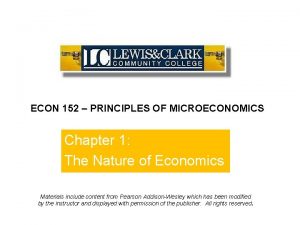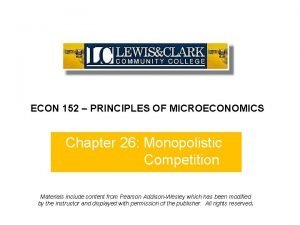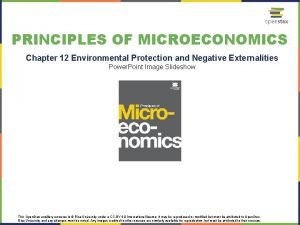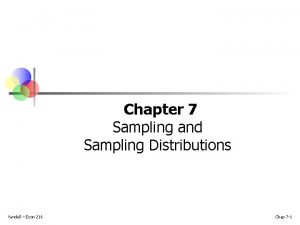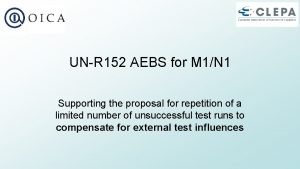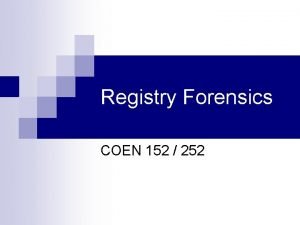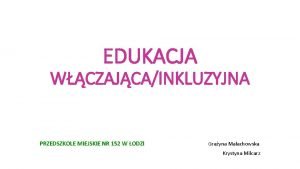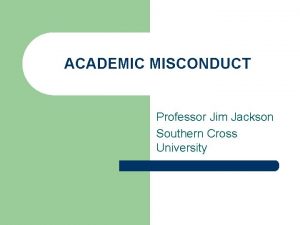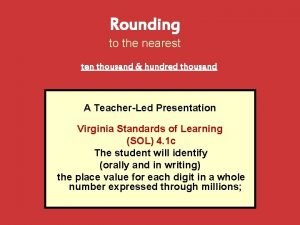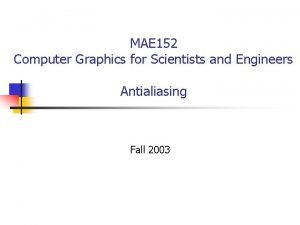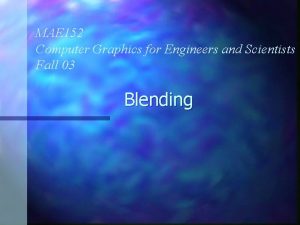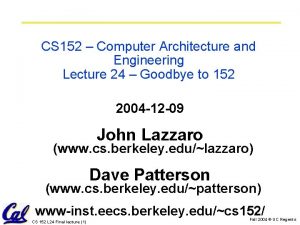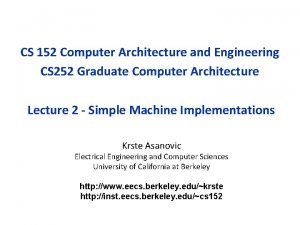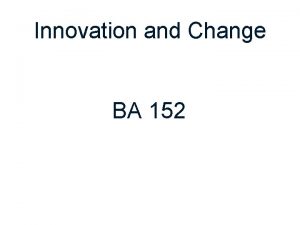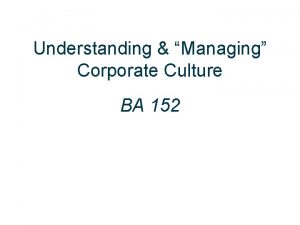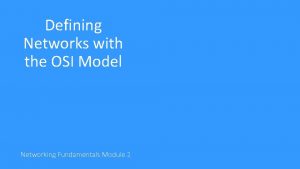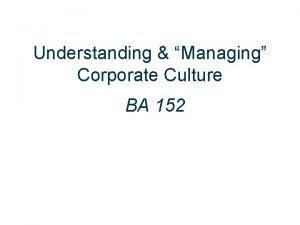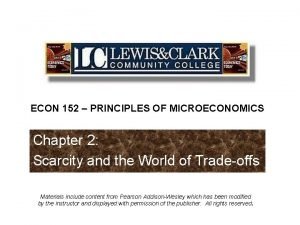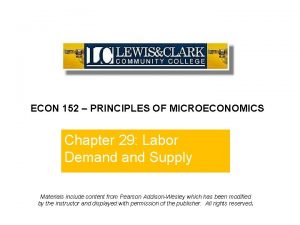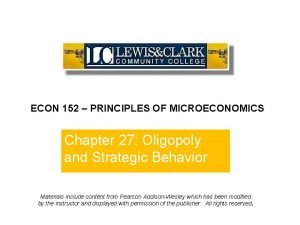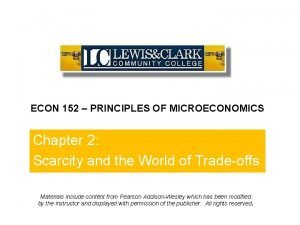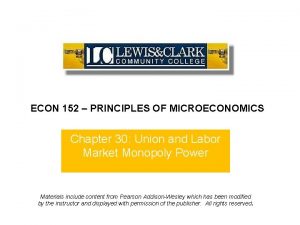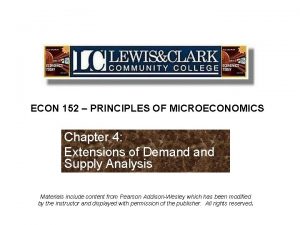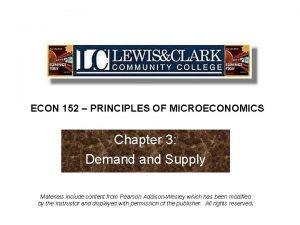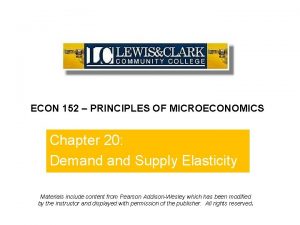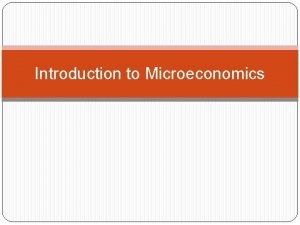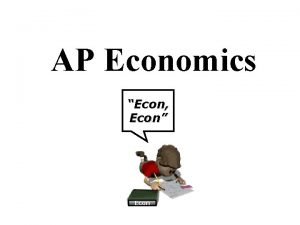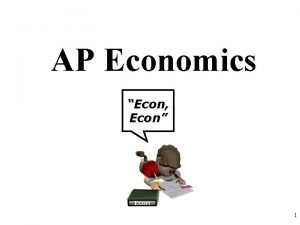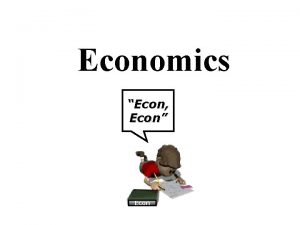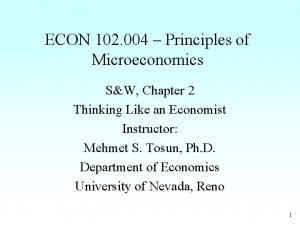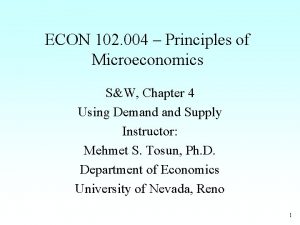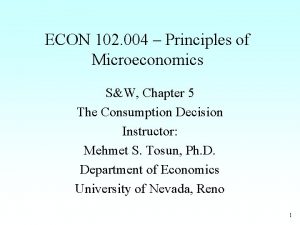ECON 152 PRINCIPLES OF MICROECONOMICS Chapter 1 The


















- Slides: 18

ECON 152 – PRINCIPLES OF MICROECONOMICS Chapter 1: The Nature of Economics Materials include content from Pearson Addison-Wesley which has been modified by the instructor and displayed with permission of the publisher. All rights reserved.

Defining Economics n Economics ¨ The study of how people allocate their limited resources to satisfy their unlimited wants ¨ The study of how people make choices 2

Defining Economics n Resources ¨ Things used to produce other things to satisfy people’s wants n Wants ¨ What people would buy if their incomes were unlimited 3

Defining Economics With limited income (resources), people must make choices to satisfy their wants. n Economics studies how these choices are made. n 4

Microeconomics versus Macroeconomics n Microeconomics ¨ The study of decision making undertaken by individuals (or households), firms and governments Pollution n Crime n Health Care n Education n ¨ The study of the significance on different market structures 5

Microeconomics versus Macroeconomics n Macroeconomics ¨ The study of the behavior of the economy as a whole Inflation n Taxes n Unemployment n Economic growth n International trade n 6

The Economic Person: Rational Self-Interest “It is not from the benevolence of the butcher, the brewer, or the baker that we expect our dinner, but from the regard to their own interest. ” —Adam Smith, An Inquiry into the Nature and Causes of the Wealth of Nations, 1776 7

The Economic Person: Rational Self-Interest n Economists assume that people make choices in their own self-interest and in a rational manner. 8

The Economic Person: Rational Self-Interest n Rationality Assumption ¨ The assumption that people do not intentionally make decisions that would leave them worse off 9

The Economic Person: Rational Self-Interest n Questions ¨ Does the fact that some people make apparently irrational choices invalidate the rationality assumption in economics? ¨ Can economic models be applied to situations in which behavior is at odds with what we expect from rational people? 10

The Economic Person: Rational Self-Interest n Rationality and the use of incentives ¨ Positive incentives ¨ Negative incentives n Making choices ¨ Balancing cost and benefits 11

The Economic Person: Rational Self-Interest n Defining self-interest ¨ The pursuit of one’s goals Humanitarian n Prestige n Wealth n Power n Friendship n 12

Economics as a Science n Models or Theories ¨ Simplified representations of the real world used as the basis for predictions or explanations n A map and getting directions are examples of models 13

Economics as a Science n Assumptions ¨ The set of circumstances in which a model is applicable n The Ceteris Paribus Assumption (KAY-ter-us PEAR-uh-bus) ¨ Nothing changes except the factor or factors being studied 14

Example: Getting Directions A map is a simplifying model of reality. n The degree of simplification varies across maps; some contain more detail than others. n Economic models attempt to focus on what is relevant to the problem at hand omit what is not. n 15

Economics as a Science n Economics is an empirical science. ¨ Real-world data is used to evaluate the usefulness of a model. ¨ Models are useful if they predict economic phenomena. n Economic models predict how people react, not how they think. 16

Positive versus Normative Economics n Positive Economics ¨ Purely descriptive statements or scientific predictions—a statement of what is n Normative Economics ¨ Analysis involving value judgments—a statement of what ought to be 17

End of ECON 152 – PRINCIPLES OF MICROECONOMICS Chapter 1: The Nature of Economics Materials include content from Pearson Addison-Wesley which has been modified by the instructor and displayed with permission of the publisher. All rights reserved.
